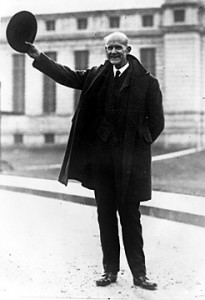Debs’ anti-war views may have been rooted in his Humanistic ideals of justice and fraternity, but perhaps more so in his strong class consciousness. At base, Debs felt all war is class war. It is armed conflict which arms the working class of both sides to go out and kill in the interest of the property of the ownership class. When war fever swept American society during World War I, Debs expressed his anti-war commitments.

It was at a Socialist Party rally in Canton, Ohio’s Mimisilla Park, on June 16, 1918, that Debs repeated his oft expressed anti-war views, this time before an estimated audience of 1200, including agents from J. Edgar Hoover’s Protective Service there to take notes on Debs’ remarks. Debs had more to criticize than War. He indicted American Institutions in general for a pro-business orientation, including the Supreme Court for its recent 5 to 4 vote declaring unconstitutional the new child labor law. “…so we may continue to grind the flesh and blood and bones of puny little children into profits for the junkers of Wall Street.” About war Debs said:
“The master class has always declared the wars; the subject class has always fought the battles. The master class has had all to gain and nothing to lose, while the subject class has had nothing to gain and all to lose — especially their lives.”
Debs was convicted under the Espionage Act and sentenced to 10 years in prison. By the time he was sentenced the war had ended and Debs was an old man aged 64. He was sent first to Moundsville, WV, then to Atlanta Federal Prison. Debs’ sentence was commuted to time served by President Harding, and he was released Christmas Day, 1921.
In the remaining years before his death in 1926, Debs continued to travel the country speaking for various causes, although health became an increasing problem. One cause was support for Sacco and Vanzetti. In a touching personal letter, in the broken English of an Italian immigrant, Vanzetti expressed his appreciation for Debs efforts and his admiration of the man. Debs donated his five dollar prison release check to the Sacco-Vanzetti Defense Fund. (see Letters, Vol. III, pp. 404-406)
Suggested Reading: Ernest Freeberg, Democracy’s Prisoner: Eugene V. Debs, the Great War, and the Right to Dissent. Harvard University Press, 2008.
“Years ago I declared that there was only one war in which I would enlist and that was the war of the workers of the world against the exploiters of the world. I declared moreover that the working class had no interest in the wars declared and waged by the ruling classes of the various countries upon one another for conquest and spoils.”

